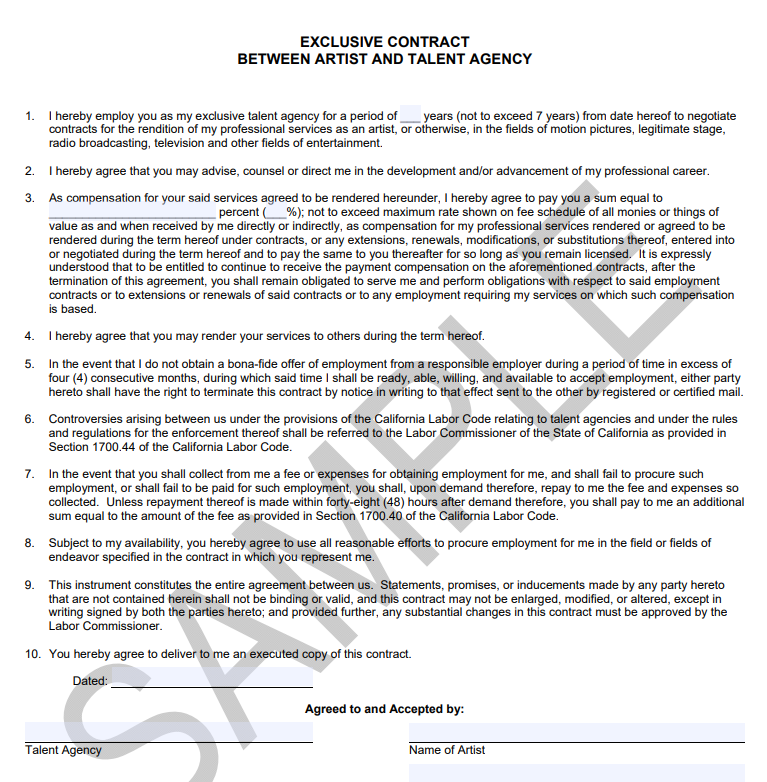Agent, Broker, Manager, oh my!
There are a lot of terms floating around about the different roles of people who work in the entertainment industry. Even in America and in English some people aren't clear on the differences. So when you start to translate that over into China and the Chinese language there are definitely gonna be some "lost in translation" type moments. So this post hopefully will help you clear up what each of these roles is, what they are in Chinese, and what they will help you to travel further on your journey as a VO in China.
Sample of Contract from California, USA.
Broker -
These are people who are usually bilingual (or semi-bilingual) and find jobs from online groups, forums, or other public places. They create their own groups of talents, repost jobs they've found in other online places, and basically do nothing more than forwarding files and payments. They take a cut from the budget (as they generally can't negotiate rates) they generally don't know about the VO industry needs from either side (client or talent) so if you ask questions like "which company is this commercial for" or "do they need me to edit this monstrosity of an English script" they generally won't have a clue. they don't make final decisions. they are the ones to be wary of when sending in small "samples" because they might just turn it in, get it accepted, and then tell you someone else got the role, and pocket that money. They will make their money by taking of cut from the Talent's side. I would never sign a contract with them or give them my passport information.
Agent/Studios -
These fall into two categories. Companies and Independent Agents.
An Agency/Studio will be a legal company that often deals with contracts, taxes, and higher-end jobs. They will translate what the director or client wants, sometimes go with you to the studio and make sure everything runs smooth. They will be actively hunting for jobs for all the talents they have, but not work with you exclusively, more or less just who is available the fastest and is the best fit for the job and budget. The contact person at these places might change, so one day it's Lily sending you messages, and next week it's Coco. their English tends to be a bit higher level, but some miscommunications might still happen because well translating a language and communicating in it is two different things. They will take their cut from the client-side usually. They might ask you to sign contracts depending on the client/project requirements.
Independent Agents might not have a legal company registered. They are similar to brokers in nature, but generally have more stable clients and can help you to communicate well. They usually understand more about the work you're doing. I've even some do light editing for you to make sure your files get accepted. They will not ask you for contracts generally unless the client requests it.
Talent Manager - These are the guys that want you to do your best. They will recommend coaches, make sure you've got sparkly demos that show off your best work. They will warn you about the clients and jobs and make sure you've got enough details to understand what you need to get the job done well. They will recommend agents to you, and they will try to arrange auditions. But legally overseas managers are not allowed to negotiate contracts, only agents can. However, as China is still the wild west a bit in the legal aspect, it seems that managers here also will double up as your agent. They may want you to sign a contract if they are going to represent you.
Some FAQ:
How much do they get paid?
It is common for an agency to be paid a commission on every penny you earn while under contract. That commission is generally 10%. It can be lower but not higher.How long should a contract be?
A talent agency agreement, exclusive or nonexclusive may not exceed 7 years in duration. Normally, they are less than that. The duration of the contract is negotiable. The term is usually between 1 to 5 years in duration. AFTRA and Equity (the unions) restrict the duration of an actor’s initial contract term to 1 year, but after that, the term can be renewed for a longer period of time.So what are agents authorized to do?
When you sign a talent agency agreement as an artist, you are authorizing the talent agency to approve and permit the use of your name, photographs, likeness, voice materials in the entertainment industry. You are further authorizing them to contract on your behalf and to collect and receive sums for your services and to deposit them directly into the talent agency accounts without your signatures, and to deduct any and all amounts owed to the talent agency.
An artist may want separate agents in different geographic areas because an agent may be well-connected in one region but not in others. This must be negotiated as agents will want to have broad representation rights.


Comments
Post a Comment